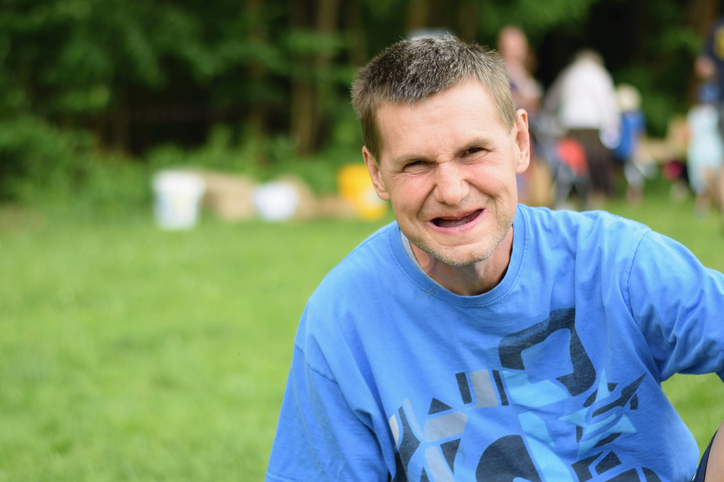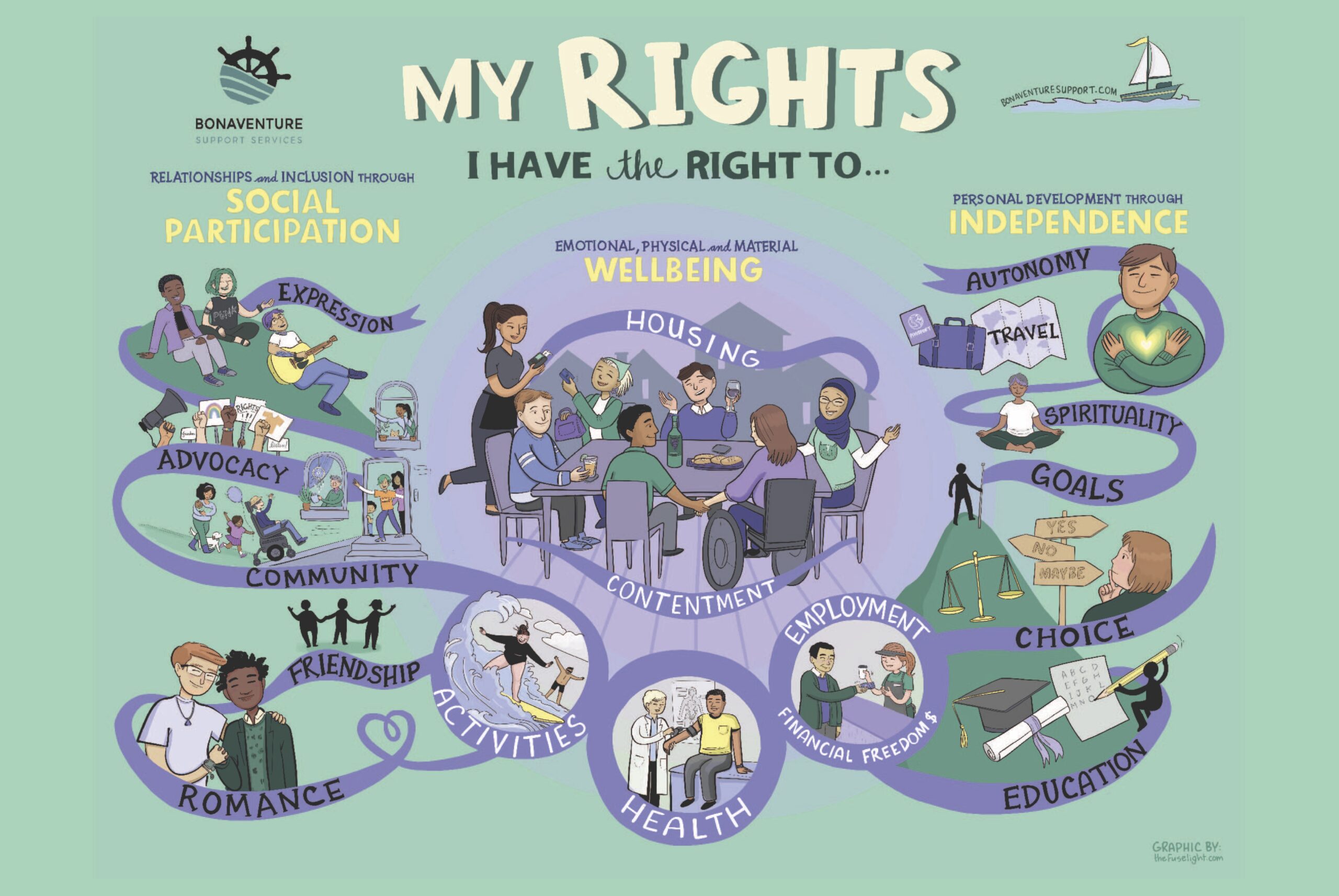Your Rights
We have a responsibility to let you know about your rights: Your rights as a person in Canada,
your rights as a person in BC, your rights as a person who uses the services of CLBC and MCFD and your rights as a person who uses the services of our agency, Bonaventure Support Services.
Check out CLBC’s rights and Safeguards guide for self-advocates Video
and CLBC’s Rights and Safeguard Guide PDF
Your Rights
Every person has rights. Rights outline someone’s basic needs and how they should be treated, no matter who they are or where they live.
Rights belong to every person and cannot be taken away from you for any reason.
There are many laws that protect the rights of adults, children, and the rights of people with diverse abilities.
You have rights:
- As a person living in one of the United Nations
- As a Canadian and as a BC resident
- As a person with disabilities
- As a person participating in our programs and services
Bonaventure has written policies to protect your rights in areas such as ensuring freedom from abuse and neglect, your privacy, confidentiality, respectful treatment, living conditions, exercising personal choice and participation. We will go through these rights with you when you start receiving services from us. We will revisit them with you at least once a year or whenever you like.
Support workers also have access to this information so that they also know about your rights. If you ever need to report that you feel someone has violated your rights, it will not be used against you.
Your Rights as an Adult
Bill of Rights
Your rights as a person living in one of the United Nations
This means that countries have agreed to have laws, policies, government support, technology that ensure children and adults with disabilities are:
- free to make their own choices,
- not discriminated against,
- included in society,
- respected,
- given equal opportunities and access to places,
- given information that is understandable to them,
- given access to housing, education, health care, and
- involved in making laws and policies.
Your rights as a person living in Canada
In 1982, the government of Canada told all Canadians about their rights in a document called the Canadian Charter of Rights and Freedoms.
Some of your rights included in this Charter are:
- the right to be treated fairly and equally regardless of your colour, sex, or age, or whether you have a physical or intellectual disability,
- the right to choose your religion,
- the right to your own thoughts and the right to talk about your thoughts,
- the right to gather with other people,
- the right to vote,
- the right to stay in Canada or to leave, and
- the right to learn.
The Charter also tells you that if anyone doesn’t allow you your rights, then you can ask people to help you make sure that your rights are respected.
Your rights as a person living in BC
In BC, there is something called the BC Human Rights Code. It says that you cannot be discriminated against because you have a physical or intellectual disability.
The code says you have the right to access the same services as everyone else including restaurants, malls, transportation, and schools, work and get the same wages as everyone else, and be treated the same as all the other tenants if you rent an apartment or a house.
Your Rights to Other Kinds of Assistance in BC
Depending on your needs and your income, you are likely eligible for:
- A monthly support allowance,
- Medical coverage, including Medical Services Plan and Pharma Care coverage, as well as other medical benefits such as glasses or dental care,
- An annual bus pass through your PWD benefits
Your rights as a person receiving services
In 2001, the provincial government said they wanted to find different ways in which decisions about individuals with disabilities, children with special needs and their families could be made. It made sense to everyone that these decisions needed to be made by those most affected. CLBC exists to help plan, fund and monitor supports and services for adults. Children with special needs have access to social workers through the Ministry of Children and Family Development.
CLBC has facilitators who can help you plan for the kinds of supports you want. It also has analysts who make decisions about funding and waitlists.
For more information you can look on its website, or you can ask a support person or family member to do this for you: www.communitylivingbc.ca
Some of the services you might be eligible for include:
- Services from a facilitator to help you make a Personal Support Plan,
- Services such as nursing, physiotherapy, and occupational therapy,
- Mental Health services and/or an assessment from the Developmental Disability Mental Health Support Team (DDMHT),
- Various forms of funding, such as Individualized Funding, and
- Referrals to specific programs, such as residential, employment, respite, counselling, community inclusion.

What can you do if someone is not respecting your rights or is discriminating against you?
Talk to your support worker or Program Manager – they can help you take some next steps.
Your Rights – Children and Youth
Unicef
Your rights as a person living in Canada
In 1982, the government of Canada told all Canadians about their rights in a document called the Canadian Charter of Rights and Freedoms.
Some of your rights included in this Charter are:
- the right to be treated fairly and equally regardless of your colour, sex, or age, or whether you have a physical or intellectual disability,
- the right to choose your religion,
- the right to your own thoughts and the right to talk about your thoughts,
- the right to gather with other people,
- the right to vote,
- the right to stay in Canada or to leave, and
- the right to learn.
The Charter also tells you that if anyone doesn’t allow you your rights, then you can ask people to help you make sure that your rights are respected.
Your rights as a person living in BC
In BC, there is something called the BC Human Rights Code. It says that you cannot be discriminated against because you have a physical or intellectual disability.
- The code says you have the right to access the same services as everyone else including restaurants, malls, transportation, and schools,
- work and get the same wages as everyone else, and
- be treated the same as all the other tenants if you rent an apartment or a house.
What can you do if someone is not respecting your rights or is discriminating against you?
Talk to your support worker or Program Manager – they can help
you to take some next steps.
Child Family and Community Services Act
are set out in the Child, Family, and Community Services
Act (Section 70).
These rights are guaranteed, which means they cannot be taken away from you.
It includes your right to:
- be fed, clothed, nurtured, & cared for as other children in the home
- be informed about your plan of care;
- have your views and opinions heard regarding decisions about you;
reasonable privacy and to possession of personal belongings (except for items which are illegal or could cause harm) - be free from physical punishment;
- be informed of the rules and what happens if they aren’t followed;
- receive medical and dental care;
- participate in social and recreational activities;
- receive religious instruction and participate in religious activities;
- receive guidance and encouragement to maintain your culture;
- be provided with an interpreter if you need one;
- privacy during discussions with a lawyer, representative, or member of government;
- be informed of your rights, and the procedures available for enforcing your rights.




